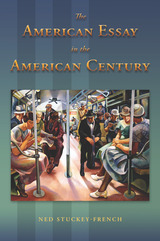2 books about White, E. B. (Elwyn Brooks)

The American Essay in the American Century
Ned Stuckey-French
University of Missouri Press, 2011
In modern culture, the essay is often considered an old-fashioned, unoriginal form of literary styling. The word essay brings to mind the uninspired five-paragraph theme taught in schools around the country or the antiquated, Edwardian meanderings of English gentlemen rattling on about art and old books. These connotations exist despite the fact that Americans have been reading and enjoying personal essays in popular magazines for decades, engaging with a multitude of ideas through this short-form means of expression.
To defend the essay—that misunderstood staple of first-year composition courses—Ned Stuckey-French has written The American Essay in the American Century. This book uncovers the buried history of the American personal essay and reveals how it played a significant role in twentieth-century cultural history.
In the early 1900s, writers and critics debated the “death of the essay,” claiming it was too traditional to survive the era’s growing commercialism, labeling it a bastion of British upper-class conventions. Yet in that period, the essay blossomed into a cultural force as a new group of writers composed essays that responded to the concerns of America’s expanding cosmopolitan readership. These essays would spark the “magazine revolution,” giving a fresh voice to the ascendant middle class of the young century.
With extensive research and a cultural context, Stuckey-French describes the many reasons essays grew in appeal and importance for Americans. He also explores the rise of E. B. White, considered by many the greatest American essayist of the first half of the twentieth century whose prowess was overshadowed by his success in other fields of writing. White’s work introduced a new voice, creating an American essay that melded seriousness and political resolve with humor and self-deprecation. This book is one of the first to consider and reflect on the contributions of E. B. White to the personal essay tradition and American culture more generally.
The American Essay in the American Century is a compelling, highly readable book that illuminates the history of a secretly beloved literary genre. A work that will appeal to fiction readers, scholars, and students alike, this book offers fundamental insight into modern American literary history and the intersections of literature, culture, and class through the personal essay. This thoroughly researched volume dismisses, once and for all, the “death of the essay,” proving that the essay will remain relevant for a very long time to come.
[more]

E.B. White
The Emergence of an Essayist
Robert L., Jr. Root
University of Iowa Press, 1999
In E. B. White: The Emergence of an Essayist, Robert Root traces the literary career of the best-known and most widely admired American essayist of the twentieth century.
Root explores the milieu in which White began writing the "Notes and Comments" section of the New Yorker and puts in perspective the influence of popular "colyumists" like Don Marquis and Christopher Morley on the tone and form of White's work as a "paragrapher." He examines White's persistent disaffection with the demands and limitations inherent in his "Comment" pieces for the New Yorker and his experiences as a columnist for Harper's Magazine, where his "One Man's Meat" feature produced his most enduring essay, "Once More to the Lake," and took the segmented column form to new levels of accomplishment. Drawing on White's manuscripts, Root's literary analysis of early drafts demonstrates how unique White's essays were.
E. B. White greatly expanded the limits of literary nonfiction and in the process introduced elements and methods that helped produce the contemporary segmented or disjunctive essay. From Root's research we receive new insights into the process by which White created his essays and how he was influenced—and often constrained—by particular literary forms and by the limitations of the circumstances in which he wrote them. White was famous for his habit of "writing by ear," and he believed in "writing a thing first and thinking about it afterward," work habits that led to some of the most memorable American literary essays of the twentieth century.
E. B. White: The Emergence of an Essayist is the most detailed study to date of White as an essayist and a significant contribution to the literature examining writers at work.
[more]
READERS
Browse our collection.
PUBLISHERS
See BiblioVault's publisher services.
STUDENT SERVICES
Files for college accessibility offices.
UChicago Accessibility Resources
home | accessibility | search | about | contact us
BiblioVault ® 2001 - 2024
The University of Chicago Press









